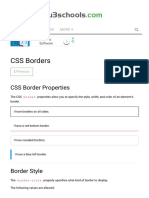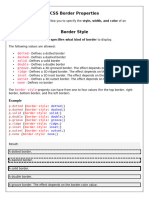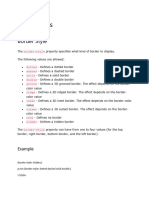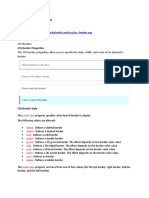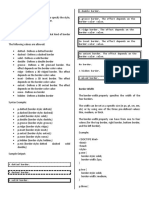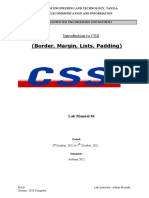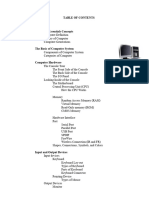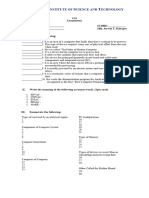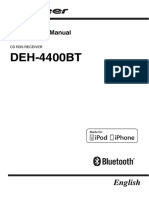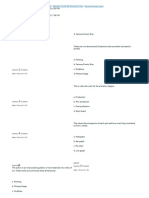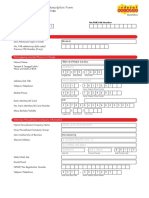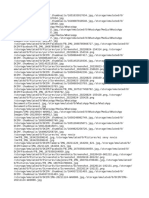CSS Border Properties
The CSS border properties allow you to specify the style, width, and color of an
element's border.
I have borders on all sides.
I have a red bottom border.
I have rounded borders.
I have a blue left border.
CSS Border Style
The border-style property specifies what kind of border to display.
The following values are allowed:
dotted - Defines a dotted border
dashed - Defines a dashed border
solid - Defines a solid border
double - Defines a double border
groove - Defines a 3D grooved border. The effect depends on the border-
color value
ridge - Defines a 3D ridged border. The effect depends on the border-color
value
inset - Defines a 3D inset border. The effect depends on the border-color
value
outset - Defines a 3D outset border. The effect depends on the border-
color value
none - Defines no border
hidden - Defines a hidden border
The border-style property can have from one to four values (for the top border,
right border, bottom border, and the left border).
Example
Demonstration of the different border styles:
p.dotted {border-style: dotted;}
p.dashed {border-style: dashed;}
p.solid {border-style: solid;}
p.double {border-style: double;}
p.groove {border-style: groove;}
p.ridge {border-style: ridge;}
p.inset {border-style: inset;}
p.outset {border-style: outset;}
p.none {border-style: none;}
p.hidden {border-style: hidden;}
p.mix {border-style: dotted dashed solid double;}
Result:
A dotted border.
A dashed border.
A solid border.
A double border.
A groove border. The effect depends on the border-color value.
A ridge border. The effect depends on the border-color value.
An inset border. The effect depends on the border-color value.
An outset border. The effect depends on the border-color value.
No border.
A hidden border.
A mixed border.
<!DOCTYPE html>
<html>
<head>
<style>
p.dotted {border-style: dotted;}
p.dashed {border-style: dashed;}
p.solid {border-style: solid;}
p.double {border-style: double;}
p.groove {border-style: groove;}
p.ridge {border-style: ridge;}
p.inset {border-style: inset;}
p.outset {border-style: outset;}
p.none {border-style: none;}
p.hidden {border-style: hidden;}
p.mix {border-style: dotted dashed solid double;}
</style>
</head>
<body>
<h2>The border-style Property</h2>
<p>This property specifies what kind of border to display:</p>
<p class="dotted">A dotted border.</p>
<p class="dashed">A dashed border.</p>
<p class="solid">A solid border.</p>
<p class="double">A double border.</p>
<p class="groove">A groove border.</p>
<p class="ridge">A ridge border.</p>
<p class="inset">An inset border.</p>
<p class="outset">An outset border.</p>
<p class="none">No border.</p>
<p class="hidden">A hidden border.</p>
<p class="mix">A mixed border.</p>
</body>
</html>
CSS Border Width
The border-width property specifies the width of the four borders.
The width can be set as a specific size (in px, pt, cm, em, etc) or by using one of
the three pre-defined values: thin, medium, or thick.
The border-width property can have from one to four values (for the top border,
right border, bottom border, and the left border).
5px border-width
Example
<!DOCTYPE html>
<html>
<head>
<style>
p.one {
border-style: solid;
border-width: 5px;
}
p.two {
border-style: solid;
border-width: medium;
}
p.three {
border-style: dotted;
border-width: 2px;
}
p.four {
border-style: dotted;
border-width: thick;
}
p.five {
border-style: double;
border-width: 15px;
}
p.six {
border-style: double;
border-width: thick;
}
p.seven {
border-style: solid;
border-width: 2px 10px 4px 20px;
}
</style>
</head>
<body>
<h2>The border-width Property</h2>
<p>This property specifies the width of the four borders:</p>
<p class="one">Some text.</p>
<p class="two">Some text.</p>
<p class="three">Some text.</p>
<p class="four">Some text.</p>
<p class="five">Some text.</p>
<p class="six">Some text.</p>
<p class="seven">Some text.</p>
<p><b>Note:</b> The "border-width" property does not work if it is used
alone.
Always specify the "border-style" property to set the borders first.</p>
</body>
</html>
CSS Border Color
The border-color property is used to set the color of the four borders.
The color can be set by:
name - specify a color name, like "red"
Hex - specify a hex value, like "#ff0000"
RGB - specify a RGB value, like "rgb(255,0,0)"
transparent
The border-color property can have from one to four values (for the top border,
right border, bottom border, and the left border).
If border-color is not set, it inherits the color of the element.
Red border
Example
<!DOCTYPE html>
<html>
<head>
<style>
p.one {
border-style: solid;
border-color: red;
}
p.two {
border-style: solid;
border-color: green;
}
p.three {
border-style: solid;
border-color: red green blue yellow;
}
</style>
</head>
<body>
<h2>The border-color Property</h2>
<p>This property specifies the color of the four borders:</p>
<p class="one">A solid red border</p>
<p class="two">A solid green border</p>
<p class="three">A solid multicolor border</p>
<p><b>Note:</b> The "border-color" property does not work if it is used
alone. Use the "border-style" property to set the borders first.</p>
</body>
</html>
CSS Border - Individual Sides
From the examples above you have seen that it is possible to specify a different
border for each side.
In CSS, there are also properties for specifying each of the borders (top, right,
bottom, and left):
Different Border Styles
Example 1
<!DOCTYPE html>
<html>
<head>
<style>
p{
border-top-style: dotted;
border-right-style: solid;
border-bottom-style: dotted;
border-left-style: solid;
}
</style>
</head>
<body>
<p>2 different border styles.</p>
</body>
</html>
Example 2
<!DOCTYPE html>
<html>
<head>
<style>
p{
border-style: dotted solid;
}
</style>
</head>
<body>
<p>2 different border styles.</p>
</body>
</html>
seen that it is possible to specify a different border for each side.
In CSS, there are also properties for specifying each of the borders (top, right,
bottom, and left):
Different Border Styles
Example
p {
border-top-style: dotted;
border-right-style: solid;
border-bottom-style: dotted;
border-left-style: solid;
}
Try it Yourself »
The example above gives the same result as this:
Example
p {
border-style: dotted solid;
}
Try it Yourself »
So, here is how it works:
If the border-style property has four values:
border-style: dotted solid double dashed;
o top border is dotted
o right border is solid
o bottom border is double
o left border is dashed
If the border-style property has three values:
border-style: dotted solid double;
o top border is dotted
o right and left borders are solid
o bottom border is double
If the border-style property has two values:
border-style: dotted solid;
o top and bottom borders are dotted
o right and left borders are solid
If the border-style property has one value:
border-style: dotted;
o all four borders are dotted
The border-style property is used in the example above. However, it also
works with border-width and border-color.
CSS Border - Shorthand Property
As you can see from the examples above, there are many properties to consider
when dealing with borders.
To shorten the code, it is also possible to specify all the individual border
properties in one property.
The border property is a shorthand property for the following individual border
properties:
border-width
border-style (required)
border-color
Example
<!DOCTYPE html>
<html>
<head>
<style>
p{
border: 5px solid red;
}
</style>
</head>
<body>
<h2>The border Property</h2>
<p>This property is a shorthand property for border-width, border-style, and
border-color.</p>
</body>
</html>
Left Border
<!DOCTYPE html>
<html>
<head>
<style>
p{
border-left: 6px solid red;
background-color: lightgrey;
}
</style>
</head>
<body>
<h2>The border-left Property</h2>
<p>This property is a shorthand property for border-left-width, border-left-style,
and border-left-color.</p>
</body>
</html>
Bottom Border
<!DOCTYPE html>
<html>
<head>
<style>
p{
border-bottom: 6px solid red;
background-color: lightgrey;
}
</style>
</head>
<body>
<h2>The border-bottom Property</h2>
<p>This property is a shorthand property for border-bottom-width, border-
bottom-style, and border-bottom-color.</p>
</body>
</html>
CSS Rounded Borders
The border-radius property is used to add rounded borders to an element:
Normal border
Round border
Rounder border
Roundest border
Example
<!DOCTYPE html>
<html>
<head>
<style>
p.normal {
border: 2px solid red;
}
p.round1 {
border: 2px solid red;
border-radius: 5px;
}
p.round2 {
border: 2px solid red;
border-radius: 8px;
}
p.round3 {
border: 2px solid red;
border-radius: 12px;
}
</style>
</head>
<body>
<h2>The border-radius Property</h2>
<p>This property is used to add rounded borders to an element:</p>
<p class="normal">Normal border</p>
<p class="round1">Round border</p>
<p class="round2">Rounder border</p>
<p class="round3">Roundest border</p>
<p><b>Note:</b> The "border-radius" property is not supported in IE8 and
earlier versions.</p>
</body>
</html>

